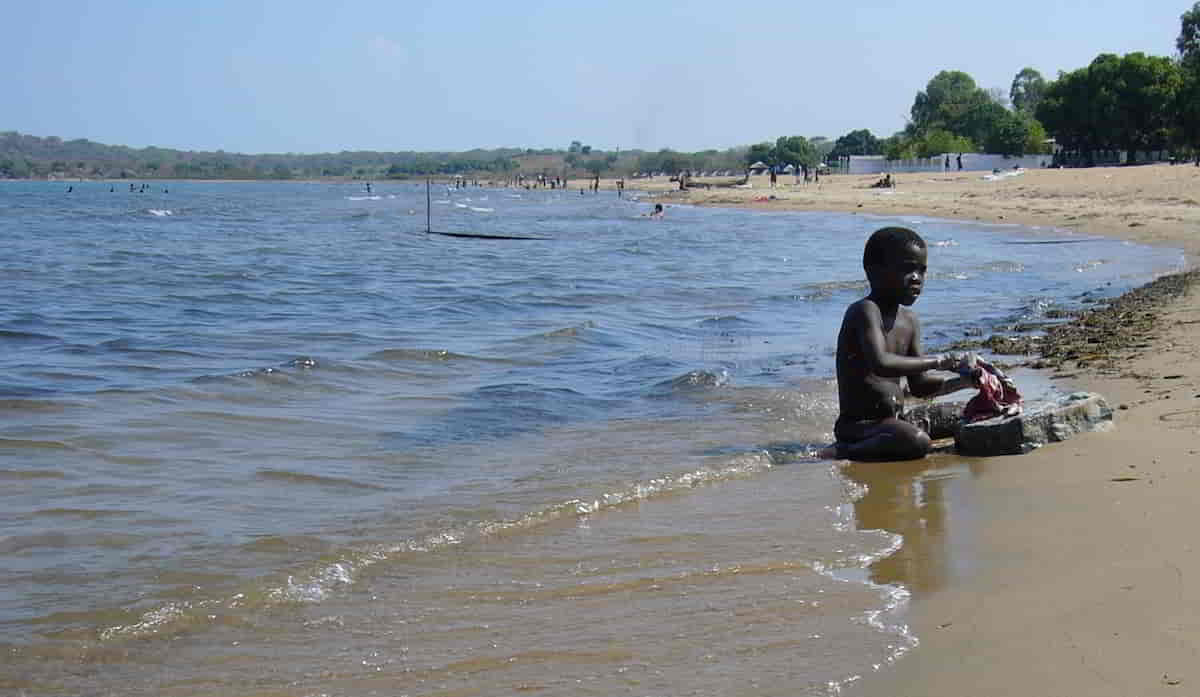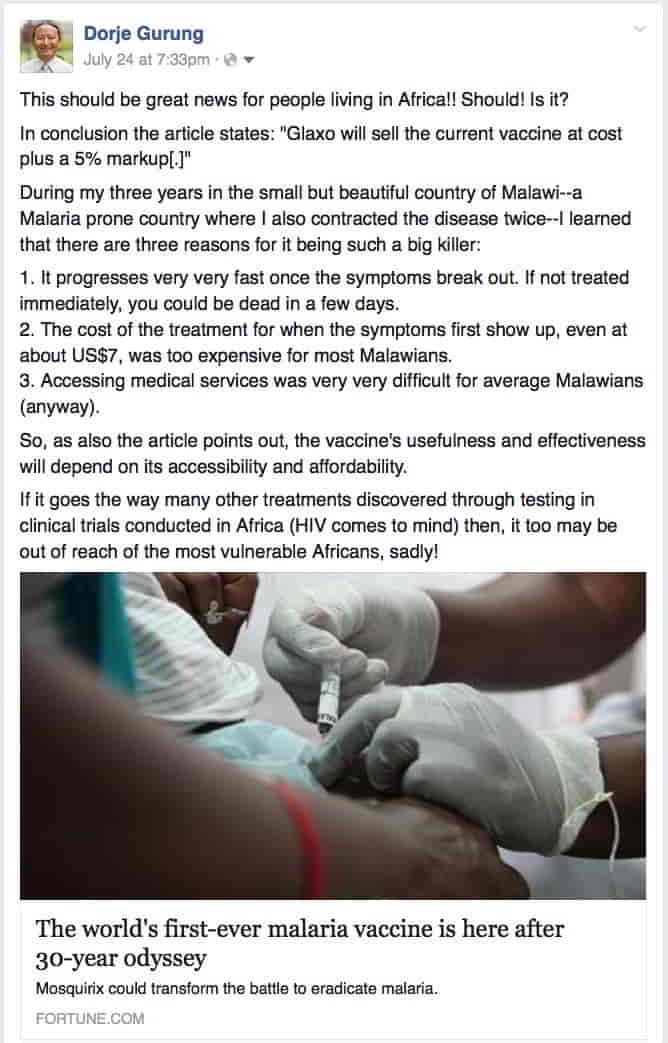
Malawi sounded fine; malaria did not!
It was the Spring of 2004, in London, UK. I had accepted a job offer in a small country in Southern Africa I had never heard of and knew next to nothing about: Malawi!
The reason I had accepted the offer was precisely that! A complete unknown, Malawi had me believing that it wasn’t suffering from some natural calamity like drought and consequently from famine (like Ethiopia), that it wasn’t suffering from some major strife like a civil war (like Somalia and a host of other nations), that it wasn’t ruled by some unscrupulous despot (like Zimbabwe and a number of others) etc. Malawi, the totally unfamiliar, sounded fine!
But malaria scared me!
At the time, along with HIV/AIDS, malaria was — and still is — one of the biggest killers of Africa, and according to UNICEF the biggest killer of African children.
I would however be reassured, by two Kenyans, that I needn’t worry about the illness until I arrived in the country, that I would know what to do once there. I had done a lot of online research; I had visited the center for tropical disease in London; I had visited another similar center in Kathmandu that summer. I had been trying vainly to get advice on whether to procure prophylactic medication, and if so, which one and when to start taking them, before arriving in the country etc. etc.
I had been finding conflicting information. One of the times I was at a cyber café in Kathmandu that summer, finding myself next to the two Africans, I had struck up a conversation about the disease when, finally, my mind was put to rest!
Sure enough, when, within two months of arriving in the country, I did contract the disease (the first time around), I realized how unfounded my fears had been!
Two days after the symptoms had first appeared, on a Monday I went to the city for a test as per a colleague’s suggestion. On describing the symptoms to the colleague, he had been certain that I had malaria! Sure enough, the results came back positive within several minutes of my blood being drawn. I was at +1 level — at the initial stage.
The second time I contracted it, as soon as the symptoms appeared, I recognized it for what it was. As it was Sunday afternoon, all the test centers in the city were closed however. But needing confirmation, I contacted an American doctor friend to see if she could arrange the test. I drove to the hospital test center my friend had arranged and sure enough the results again came back positive — and again it had just broken out.
If you have suffered from the disease once, it’s very easy to recognize the symptoms for what they are, which, when they do show up, are quite sudden! If you have your own mode of transportation, or can count on one, it takes no effort and costs very little to confirm its onset. To an expat, treatment is very very cheap as well.
The second time around too, I had no trouble getting treatment and, soon after, going into recuperation mode. I got the drugs I needed and I got time off from work etc. I got rid of the disease within a few days, but, not unlike the first time around, my body took a while to recover completely. As malaria wears your body down, it takes a while for it to rebound back to functioning at 100%.
Unfortunately, most Malawians and others living in Sub-Saharan Africa aren’t very well off, and that’s partly the reason for the high mortality rate.
As a matter of fact, Malawi, sadly, is one of the poorest countries in the world. When I was working there, the belief was that it was one of the five poorest nations.
So, being poor, firstly, Malawian aren’t able to take many precautions (like sleeping under a mosquito net and/or using insect repellents and/or wearing proper clothing and/or taking prophylactic etc.).
Secondly, if they contract the disease, they are most likely unable to readily avail themselves of medical attention. Public transportation — even within the city — was not extensive and what was available was not cheap! What medical services were available to most Malawians — even in the capital city — were very limited and not readily accessible.
The disease can progress quickly from +1 to +2 to +3 and then +4 within days if not treated. At +4 you go into a coma and the chance of your waking up is very very slim…unless you get immediate medical attention!
While the discovery of the vaccine against the disease is a welcome development, I wonder if this will help the most needy!
Most Africans are poor, desperately poor sadly, partly out of neglect by their leaders and partly because of neglect and exploitation by others from outside the continent! (The first time I came across destitution was in Malawi!)
According to UNICEF, “Over one million people die from malaria each year, mostly children under five years of age, with 90 per cent of malaria cases occurring in Sub-Saharan Africa.” I don’t recall a single student at the international school I taught dying of the disease!
The children that suffer and die everyday in Malawi and elsewhere in that amazing continent are the poor and the destitute!
But you know what the crazy thing about this is? Malaria is a preventable disease!
And when I came across an article describing the discovery of a vaccine, I was skeptical, posting the following on my Facebook timeline. (Click here for the article.)

So my questions are:
Will it be cheap enough for the poorest and the most vulnerable in the African continent?
Will it be easily accessible to them?
Or will it go the way treatments of other killer diseases have, such as the treatment for HIV/AIDS, a treatment the discovery and development of which included clinical trials in the African continent?
Incidentally, the biggest killer of Africans is HIV/AIDS
* * * * * * * *
References
- World’s first malaria vaccine, from GlaxoSmithKline, wins approval from EU.
- FACTSHEET: The leading causes of death in Africa. Informational page on Africa Check’s web site. It uses WHO 2012 figures.
- The Reality of Malaria. UNICEF brief about the disease in the continent of Africa.
- Control and elimination of Plasmodium vivax malaria – A technical brief July 2015. Published by WHO.
- Big Pharma and Organized Crime — They are More Similar Than You May Think.
- Medical experimentation in Africa.
- Malaria: Could You Recognize the World’s Number Two Killer?.

Indeed, about $US7 was all it cost us for the treatment of an infant who was diagnosed at 4+, including hospitalisation for a week and the necessary drugs. But the subtext of that was that his father earned around one dollar a day, and kept more than twenty extended family on his wages – to spend $7 would have meant everyone else going hungry. And still we exploit people in these circumstances, including big pharma making a 5% profit. As a species we have the ability to be incredibly inhumane.